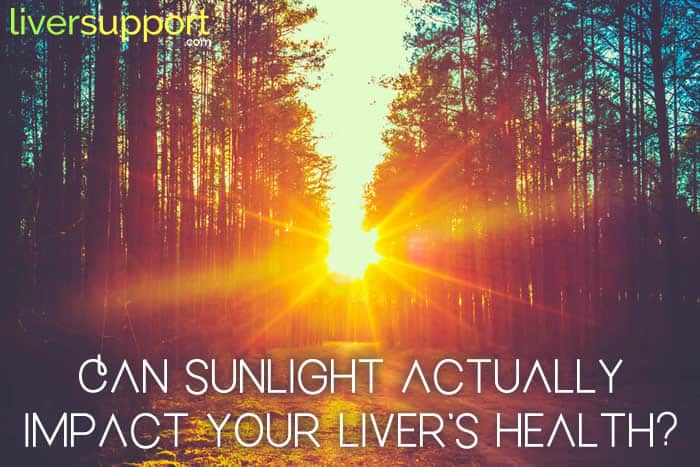
Previous
Liver Disease and Sex: An Informative Guide

Next
Weight and Obesity May No Longer Be Leading Indicators of Fatty Liver Disease
Can Sunlight Actually Impact Your Liver’s Health?
Is there a direct link between climate, sunlight and the health of your liver?
In short, it’s good. Quite good. From a statistical standpoint, getting more sunlight sets your liver up for better odds of being healthy. That’s because your skin can make large amounts of vitamin D when exposed to sunlight and, as you’ll find out below, vitamin D is thought to be an important factor in liver homeostasis and much more.
Transversely, living in cold environments often leads to some not so healthy behaviors which negatively impact your liver (5). These behaviors include:
- higher alcohol consumption to stay warm
- less outdoor activity due to harsh conditions
- and vitamin D deficiencies from lack of sun exposure
All of the above are tied to high rates of liver disease (1).
So while the sun never shines directly on your liver, the presence of regular sunlight is ultimately good for it and increases the likelihood of having a healthy liver.
The Connection Between Your Liver and the Sun
While the correlation may seem simple, the scientific community only recently began connecting the dots between liver health and climate. A string of studies examining the liver’s relationship with vitamin D as well as climate and environment over the past decade have set the stage for a more comprehensive discussion about the relationship between the liver and the sun.
But before starting your new vitamin D regimen or scheduling more beach time, always consult your doctor. And, just like anything else, it’s important to remember that too much sun or vitamin D can be a bad thing – and not just for your liver.
There’s a reason prolonged sun exposure has a reputation for causing skin cancer. There is a recommended daily dose of vitamin D and sun exposure, as well as precautions to be taken whether you live in a climate with regular sunlight or not.
The Facts
Doctors recommend 5,000 IU of vitamin D for optimal health.
For healthy levels of vitamin D, aim for 10-30 minutes of midday sun several times per week, more if you have darker skin (3). This is the easiest way to get your vitamin D.
However, if you don’t live in a sunny climate with year-round sunshine, you may be more likely to suffer from a vitamin D deficiency. The implications of this deficiency are not good, especially for your liver.
While vitamin D is important for bone health, it’s also thought to be an important factor in liver homeostasis, as well as a number of other natural processes throughout the body (1).
Bad Weather, Bad Liver
An interesting piece of research from the University of Pittsburg finally made a scientific correlation between liver disease and climate last year. Researchers used data from 193 sovereign countries, 50 states and 3,144 counties in the United States and determined that “worldwide and in America, in colder areas and areas with less sun, you have more drinking and more alcoholic cirrhosis.”
The reason alcohol is well-suited for cold weather is because it’s a vasodilator, meaning it increases the warm blood flow to the skin and promotes feelings of warmth. This is one reason why cold weather is not a friend of the liver.
Additionally, recent findings published in the April 2018 Nutrients found that “vitamin D deficiency is common in hepatitis C virus patients (1).”
So if getting 10-30 minutes of sunlight several times per week is not achievable in the area you live, vitamin D supplements may be your best bet to avoid deficiency.
What Keeps Someone from Getting Enough Sunlight?
Other scenarios that may prohibit someone from getting sunlight would include certain rare genetic disorders such as Porphyria Cutanea Tarda (PCT) that make sufferers extremely sensitive to sunlight and also quicker to sunburn (7).
Sunburns are also a leading factor in contracting melanoma in adults. While UVB rays from the sun are generally good for the liver by promoting vitamin D production, overdoing it can lead to health risks.
Supplements would also be advised in these cases to ensure getting the right amount of vitamin D if natural sunlight isn’t an option.
While vitamin D and how it affects our liver is still an area that needs research, we know this much: it’s important enough to our biology that we synthesize our own vitamin D naturally in our skin with the help of ultraviolet rays from the sun (2).
Basically, our skin naturally converts the molecule 7-dehydrocholesterol to vitamin D (2). From an evolutionary standpoint, it seems to be an indication of how important the sun and vitamin D truly are for us.
Vitamin D has also been known to be a powerful tool in the fight against liver fibrosis (5). In fact, vitamin D offers “the protective effects of sunlight through a variety of mechanisms that suppress liver inflammation (4).”
Sunlight and Vitamin D Help More than Just Your Liver

Sunlight and vitamin D also play crucial roles in other bodily functions outside of the liver. For example, it can support brain health. Researchers learned through trials with mice that vitamin D deficiency had greatly reduced cognitive function and impeded the ability to learn new things and remember (6).
Additionally, healthy vitamin D levels and sun exposure not only bolsters the immune system but can also improve your mood (6).
And let’s not forget what vitamin D is most commonly known for – providing a way for your bones to absorb calcium, stay strong, and promote bone growth. That’s why vitamin D deficiencies are also commonly tied to soft bones in children (rickets) and weak, fragile, or misshapen bones in adults (osteomalacia).
How Much Sun Is Too Much?
Typically, vitamin D toxicity is caused by overdoing it on supplements and not by sun exposure. However, we’re talking about consistent doses of around 60,000 IU for several months. But that level of toxicity is difficult to achieve.
Just remember, before taking any drastic measures or changing routines or diets, always consult your doctor. The sun is generally a huge asset and plays a key role in the production and processing of key compounds in our body, but too much of anything is bad.
Interesting Bilirubin/Vitamin D Fact
Did you know that, if you are dealing with high bilirubin levels it may be because your liver isn’t clearing it properly or you aren’t getting enough sun exposure? And, yes, vitamin D can help lower bilirubin levels in adults!
- Keane, J. T., Elangovan, H., Stokes, R. A., & Gunton, J. E. (2018, April 16). Vitamin D and the Liver-Correlation or Cause? Retrieved July 22, 2019, from https://www.ncbi.nlm.nih.gov/pmc/articles/PMC5946281/Articles from Nutrients are provided here courtesy of Multidisciplinary Digital Publishing Institute (MDPI)
- Nair, S. (2010, August). Vitamin d deficiency and liver disease. Retrieved July 22, 2019, from https://www.ncbi.nlm.nih.gov/pmc/articles/PMC2950664/ Articles from Gastroenterology & Hepatology are provided here courtesy of Millenium Medical Publishing
- Office of Dietary Supplements - Vitamin D. (2019, July 9). Retrieved July 22, 2019, from https://ods.od.nih.gov/factsheets/VitaminD-HealthProfessional/ Updated: July 9, 2019
- Gorman, S., Black, L. J., Feelisch, M., Hart, P. H., & Weller, R. (2015, May 05). Can skin exposure to sunlight prevent liver inflammation? Retrieved July 23, 2019, from https://www.ncbi.nlm.nih.gov/pmc/articles/PMC4446748/ Articles from Nutrients are provided here courtesy of Multidisciplinary Digital Publishing Institute (MDPI)
- Colder, darker climates increase alcohol consumption and liver disease. (2018, November 14). Retrieved July 23, 2019, from https://www.sciencedaily.com/releases/2018/11/181114080917.htm Published by University of Pittsburgh Schools of the Health Sciences
- Sandoiu, A. (2019, February 25). Vitamin D and brain health: New mechanism may explain link. Retrieved July 23, 2019, from https://www.medicalnewstoday.com/articles/324541.php published by Healthline Media UK Ltd, Brighton, UK.
- Uvahealth. (2019, June 17). Quick to Sunburn? Extreme Sun Sensitivity a Sign of Two Rare Genetic Conditions. Retrieved July 23, 2019, from https://blog.uvahealth.com/2019/06/18/extreme-sun-sensitivity/ Published by University of Virginia health System
- New research shows link between binge drinking alcohol, living in colder climates. (2018, December 11). Retrieved July 23, 2019, from https://www.accuweather.com/en/weather-news/are-you-more-likely-to-binge-drink-have-alcoholic-liver-disease-if-you-live-in-a-colder-climate/70006860






